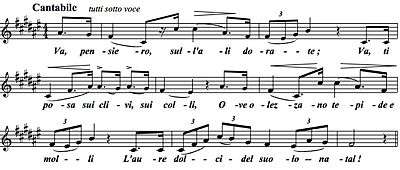Va, pensiero

"Va, pensiero" (Italian: [ˈva penˈsjɛːro]), also known in English as the "Chorus of the Hebrew Slaves", is a chorus from the third act of the opera Nabucco (1842) by Giuseppe Verdi, with a libretto by Temistocle Solera, inspired by Psalm 137. It recollects the story of Jewish exiles in Babylon after the loss of the First Temple in Jerusalem. The opera with its powerful chorus established Verdi as a major composer in 19th-century Italy. The full incipit is "Va, pensiero, sull'ali dorate", meaning "Go, thought, on golden wings" (note that the first word is in modern orthography spelled Va', with an apostrophe, but this is absent in the libretto).
Role in Italian political history
Some scholars initially thought that the chorus was intended to be an anthem for Italian patriots, who were seeking to unify their country and free it from foreign control in the years up to 1861 (the chorus's theme of exiles singing about their homeland, and its lines like O mia patria, si bella e perduta / "O my country, so beautiful, and lost" was thought to have resonated with many Italians).[1] Some modern scholars have rejected this idea, failing to see connections between Verdi's 1840s and 1850s operas and Italian nationalism, with the exception of some of the sentiments expressed in his 1843 opera, I Lombardi.[2]
Other recent research has discussed several of Verdi's works from the 1840s (including Giovanna d'Arco and Attila) emphasising their ostensible political meaning.[3] Work by Philip Gossett on choruses of the 1840s also suggests that recent revisionist approaches to Verdi and the Risorgimento may have gone too far in their thorough dismissal of the political significance of "Va, Pensiero".[4]
On 27 January 1981 the journalist and creative writer Giorgio Soavi proposed replacing Italy's national anthem with "Va, pensiero" in a letter published by Indro Montanelli in his daily newspaper Il Giornale. The proposal was widely discussed for some time and then abandoned until 2009, when Senator Umberto Bossi took it up again,[5] but to no effect. However, Bossi's political party, Lega Nord/Padania, has adopted "Va, pensiero" as its official hymn and the chorus is now sung at all party meetings.[6]
In 2011, after playing "Va, pensiero" at a performance of Nabucco at the Teatro dell'Opera in Rome, conductor Riccardo Muti made a short speech protesting cuts in Italy's arts budget, then asked the audience to sing along in support of culture and patriotism.[7]
Initial reception
Verdi composed Nabucco at a difficult moment in his life. His wife and small children had all just died. He had contracted with La Scala to write another opera and the director forced the libretto into his hands. Returning home, Verdi happened to open the libretto at "Va, pensiero" and seeing the phrase, he heard the words singing. At first rehearsal "the stagehands shouted their approval, then beat on the floor and the sets with their tools to create an even noisier demonstration".[8] As he was subsequently to note, Verdi felt that "this is the opera with which my artistic career really begins. And though I had many difficulties to fight against, it is certain that Nabucco was born under a lucky star".[9]
Upon Verdi's death, along his funeral's cortege in the streets of Milan, bystanders started spontaneous choruses of "Va, pensiero...". A month later, when he was reinterred alongside his wife at the "Casa di Riposo", a young Arturo Toscanini conducted a choir of eight hundred in the famous hymn.
Text
Va, pensiero, sull'ali dorate;
|
Go, thought, on wings of gold; |
See also
- Italian Neoclassical and 19th-century art
- Rivers of Babylon, yearnings of the Jewish people in Babylonian captivity
References
Notes
- ↑ Paul Halsall, "Modern History Sourcebook: Music and Nationalism", Aug 1997, revised July 1998 on fordham.edu Retrieved 23 December 2009
- ↑ Roger Parker, "Verdi and Milan", lecture which discusses Nabucco, given at Gresham College, London 14 May 2007: see below
- ↑ Francesco Izzo, “Verdi, the Virgin, and the Censor: The Politics of the Cult of Mary in I Lombardi alla prima Crociata and Giovanna d’Arco”, Journal of the American Musicological Society, 60 (2007): pp. 557–597.
- ↑ Gossett, pp. 339–387
- ↑ "Senator wants to change Italy's national anthem – to opera". Christian Science Monitor. 24 August 2009.
- ↑ "National Anthem"; see also Va' pensiero Padania
- ↑ "Riccardo Muti conducts audience during Rome performance". Chicago Sun Times. 12 March 2011.
- ↑ Phillips-Matz, p. 116, noting a later statement by the composer
- ↑ Verdi, "An Autobiographical Sketch" (1879), in Werfel & Stefan, p. 92
Cited sources
- Gossett, Philip, in Victoria Johnson, Jane F. Fulcher, and Thomas Ertman,(Eds.), "Le 'edizioni distrutte' e il significato dei cori operistici nel Risorgimento", Saggiatore musicale, 12 (2005). English translation, "'Edizioni distrutte' and the Significance of Operatic Choruses during the Risorgimento", Opera and Society in Italy and France from Monteverdi to Bourdieu, Cambridge: Cambridge University Press, 2007. ISBN 0-521-12420-4 ISBN 0-521-12420-4
- Parker, Roger, "Verdi and Milan", lecture on Verdi's relationship with Milan, including details of Nabucco, given at Gresham College, London, 14 May 2007
- Phillips-Matz, Mary Jane (1993). Verdi: A Biography (1st ed.). Oxford University Press. ISBN 0-19-313204-4.
- Werfel, Franz and Stefan, Paul (trans. Edward Downes), Verdi: The Man in his Letters, New York: Vienna House, 1973. ISBN 0-8443-0088-8
Other sources
- Budden, Julian. The Operas of Verdi, Vol. 1. London: Cassell Ltd, 1973. pp. 89–112. ISBN 0-304-31058-1
- Parker, Roger (ed), "Nabucodonosor": Dramma Lirico in Four Parts by Temistocle Solera (the works of Giuseppe Verdi), Chicago: University of Chicago Press, 1988 ISBN 978-0-226-85310-9 ISBN 0226853101
External links
- "Va, pensiero" on YouTube, by Israeli Opera in Hebrew on Israel's Independence Day 2010 at Mount Herzl, Jerusalem
- "Va, pensiero" on YouTube, Ricardo Muti's speech in 2011 and audience participation